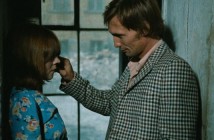
Under the Shadow (dir. Babak Anvari, 2016)
Under the Shadow: Out-Babadooking The Babadook, Babak Anvari’s feature filmmaking debut, Under the Shadow, a psychological horror film set in the waning days of the Iran-Iraq War (1988), a war that seemed endless – as all wars do – to those suffering directly from the devastating, destructive effects of armed conflict between nations, uses the war not just as background or context (commendable on its own), but to inform the increasingly unstable inner life of its protagonist, Shideh (Narges Rashidi), a thirty-something, married housewife and mother living under the oppressive, repressive conditions of Iran’s post-revolutionary regime. Turned away from completing her medical studies due to long-ago, left-wing student activism and counseled by her physician husband, Iraj (Bobby Naderi), to move on with her life, Shideh’s struggles are both culturally and historically specific and completely relatable. Left with the diminished sphere of her apartment and her duties and obligations as a mother to Dorsa (Avin Manshadi), a precocious pre-adolescent with an over-fond, talismanic attachment to a doll, Shideh struggles to retain a semblance of sanity. Periodic bombing raids by the Iraqis and her husband’s yearly conscription into the army’s medical staff further weaken Shideh’s emotional and mental instability. As Shideh’s neighbors leave family-by-family, Shideh’s isolation grows. Initially dismissive of Dorsa’s talk of djinns (evil spirits), Shideh’s adherence to reason and rationality also gives. Anvari smartly builds the horror from the inside-out, starting with the premise (thankfully minus the over-explanation that all too frequently scuttles mainstream horror films) before systematically taking away the pillars of Shideh’s social life. When the shocks and scares come – and they do come – they feel completely earned (because they are), with our sympathies and empathy fully with Shideh and Dorsa. Anvari draws as much from genre masters like Jack Clayton (The Innocents), Robert Wise (The Haunting), and Guillermo del Toro (The Devil’s Backbone) as he does from Iran’s recent turbulent history, adding depth, nuance, and subtext too often missing from contemporary entries in the horror genre (Ana Lily Amirpour’s A Girl Walks Home Alone At Night notwithstanding). Familiarity with the masterpieces of the genre, however, does little, if anything, to diminish Anvari’s remarkable contribution to the genre.

The Eyes of My Mother
The Eyes of My Mother: Infamous cannibal/serial killer Ed Gein – the inspiration for both Psycho and The Texas Chainsaw Massacre – gets the gender reversal treatment in Nicolas Pesce’s gothic noir-thriller, The Eyes of My Mother. Shot in luminous black-and-white by cinematographer, Zach Kuperstein, The Eyes of My Mother chronicles the psychological fragmentation and disintegration of a young woman, from her preteen years in a not-quite-bucolic setting, a desolate, isolated, seemingly timeless farmstead – it could be 1955, 1985, or 2015 for all the audience or the central character knows – operated by her Portuguese, ex-doctor mother and a significantly older man (we never learn how or why they met or how the mother ended up immigrating to America). Pesce divides The Eyes of My Mother into three, broad chapters, “Mother,” “Father,” and “Family,” simple, albeit powerful, words that suggest an entirely different focus than what Pesce gives the audience. In the first chapter, Francisca (Olivia Bond), briefly develops an interest in biology and dissection from her mother before a sudden, violent tragedy completely subverts not only her world, but her worldview as well. With her emotional and mental state both defined and halted by the tragedy and a kind of frontier justice that turns into something darker and more twisted, Francisca (Kika Magalhaes) experiences a second, devastating loss as a young adult that sends down a violently destructive path, the combination of a desperate, unquenchable need for human connection, the absence of social acculturation (life beyond the farm and her parents seems to be nonexistent), and a childlike tendency to indulge wants and needs unfettered by social strictures and mores. Adopting a meticulously minimalist approach, first-time feature filmmaker Pesce – making the jump from directing music videos and Josh Mond’s Sundance 2015 favorite, James White – avoids the sensationalistic and exploitative aspects typical of the more explicit variations and iterations of the horror genre, pushing the depiction of violence if not to the margins, then mostly offscreen where audience imaginations can (and will) imagine far worse. With an equally spare, distinctive score by first-time composer, Ariel Loh, The Eyes of My Mother makes a bid for the most discomforting, disturbing horror film since last year’s must-see psychological horror film, Goodnight, Mommy.

Pleasure, Love
Pleasure, Love: Hailing from mainland, mainstream China, Yao Huang’s lifeless, tedious romantic drama, Pleasure, Love, offers little for anyone looking for a bold new voice in international filmmaking. Crammed from beginning to end with romantic tropes and conventions that were overly familiar, if not outright clichés, 20-30 years stateside, Pleasure, Love focuses on two thematically and narratively linked stories separated in time, one unfolding right before the 2008 Beijing Olympics and the other unfolding roughly a decade earlier, more or less (Huang blurs the chronology by essentially creating a temporal loop out of an old science-fiction program). In each one, a college student or college graduate begins an ill-fated romance with an older, supposedly more experienced, knowledgeable partner, with predictably heartbreaking results for the younger lover. Huang swaps out the genders, a young man, older woman in the first story, an older man, younger woman in the second story, but fails to go beyond surface-deep observations about romantic love, leaving the audience to repeatedly make up the emotional difference. In each narrative, the lovers meet in a dancehall, with “Auld Lang Syne,” a New Year’s Eve staple stateside and in Europe, musically connecting the lovers and their shallow search for sexual and emotional intimacy. Visual motifs, signifiers of the powerful, oppressive consequences of unrequited or partially requited love abound, but to little lasting effect, emotionally or dramatically. Huang repeatedly hammers moviegoers with unearned, cheap sentimentality, the obvious sign of a filmmaker desperately trying to say something, anything, but having absolutely nothing – at least nothing new – to say about the complexities of romantic love, in or out of contemporary China.



